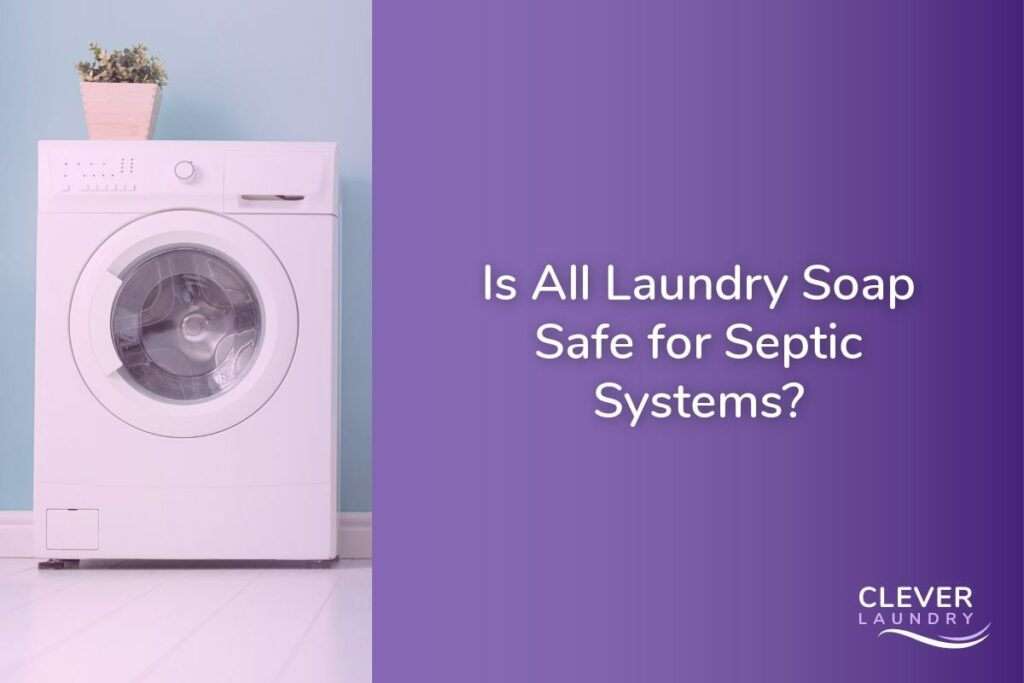- Septic Systems 101
- Laundry Soap and Septic Systems: Friends or Foes?
- Tips and Tricks for a Happy Septic System
- 1. Don't go overboard with the detergent
- 2. Choose the right laundry cycle
- 3. Keep up with regular maintenance
- 4. Pre-treat stains before washing
- 5. Use a high-efficiency washing machine
- 6. Spread out your laundry loads
- 7. Be mindful of water softeners
- 8. Educate your family
- 9. Regularly check for leaks
- 10. Stay informed
- Final Words
Laundry day! We’ve all been there. The overflowing hamper, the sorting of colors and whites, and of course, choosing the perfect detergent to make our clothes squeaky clean. But wait! If you live in a rural area with a septic system, you might want to pump the brakes on grabbing just any old detergent off the shelf. Your septic system relies on good bacteria to break down waste, and some detergents can give these helpful little critters a one-way ticket to the afterlife. So, is any laundry soap safe for your septic system? Let’s dive in and find out.
Septic Systems 101
Picture this: you live in a charming countryside home, far from the hustle and bustle of the city. No sewer system in sight. Enter the septic system! This underground superhero of waste management consists of a buried septic tank and a drain field, working together to treat and dispose of your household wastewater right on your property. Sounds cool, right?
Well, this marvel of engineering relies on a delicate balance of bacteria to keep things running smoothly. So, if your detergent is too harsh, it could throw a wrench into the works and lead to costly repairs. But fear not! There are septic-safe detergents out there that are gentle on your system and the environment. Keep your eyes peeled for labels that say “septic safe” or “safe for septic systems.”
Laundry Soap and Septic Systems: Friends or Foes?
We all know and love laundry soap – it’s the magical potion that makes our clothes smell fresh and look spotless. But some laundry soaps can be a real party pooper for septic systems. The culprits? Phosphates, fragrances, dyes, and other additives that might look and smell great, but can wreak havoc on your septic system’s delicate ecosystem.
So, how do you choose a detergent that won’t leave your septic system in tears? Here are some tips:
Look for septic-safe labels
Whether you prefer powder or liquid detergent, make sure it’s got a septic-safe label. These detergents are formulated to be low-sudsing and biodegradable, which means they won’t harm your septic system or the environment.
Give soap nuts a whirl
These natural nuts contain saponin, a natural detergent that’s gentle on your septic system. Plus, they’re eco-friendly to boot!
Try a baking soda and vinegar combo
It may not be as effective as traditional detergents, but it’s safe for septic systems and can help reduce your environmental footprint.
Tips and Tricks for a Happy Septic System
Now that you’ve got the right detergent, let’s talk about some best practices to keep your septic system running like a well-oiled machine:
1. Don’t go overboard with the detergent
Using too much detergent can lead to an overflow or clog in your septic system. Stick to the recommended amount for each load of laundry.
2. Choose the right laundry cycle
Opt for cycles that use less water, like “light” or “delicate.” And skip the “extra rinse” cycle – it just adds more water to the mix.
3. Keep up with regular maintenance
Get your septic system inspected and pumped every three to five years by a professional. And avoid flushing non-biodegradable items down the toilet or sink – they can clog your system and cause backups.
4. Pre-treat stains before washing
When dealing with stubborn stains, pre-treat them with a septic-safe stain remover before tossing them into the wash. This can help reduce the need for multiple wash cycles or the temptation to use more detergent than necessary.
5. Use a high-efficiency washing machine
High-efficiency washing machines use less water and detergent, which can help reduce the strain on your septic system. If you’re in the market for a new washer, consider investing in an energy-efficient model.
6. Spread out your laundry loads
Instead of washing multiple loads of laundry in a single day, try spacing them out over several days. This can help prevent your septic system from becoming overloaded with too much water in a short period.
7. Be mindful of water softeners
If you use a water softener, be aware that the salt can be detrimental to the helpful bacteria in your septic system. Look for a water softener that’s specifically designed for use with septic systems or consider alternative water treatment options.
8. Educate your family
Make sure everyone in your household understands the importance of using septic-safe laundry detergents and following best practices for maintaining a healthy septic system. The more everyone knows, the easier it will be to keep your system running smoothly.
9. Regularly check for leaks
Keep an eye on your washing machine hoses and connections to ensure there are no leaks. Small leaks can add up over time, causing extra water to enter your septic system and potentially leading to issues.
10. Stay informed
Stay up-to-date on the latest advancements in septic-safe laundry detergents and best practices for maintaining your septic system. Knowledge is power, and being well-informed can help you make the best decisions for your home and the environment.
Final Words
Taking care of your septic system doesn’t have to be a complicated affair. By choosing the right laundry detergent, adopting eco-friendly laundry habits, and properly maintaining your septic system, you can ensure its longevity and effectiveness. With a little bit of effort and mindfulness, you’ll be well on your way to a greener, cleaner laundry day!

